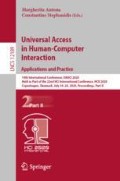Abstract
Speaker Identification is the process of a machine identifying who is speaking automatically based solely on the voice of the person speaking. Recognising a person in a meeting room or on telephone, purely from their voice is an important and interesting research challenge. The voice is one of the human biometric properties. Recognition of a particular person’s voice can be used in different applications such as: unlocking an office door, marking student or employee attendance, monitoring elderly people’s health, online banking services, or helping people with dementia to be able to identify a who is speaking. This paper explores a range of such applications and discusses how emerging technologies can be used to support a variety of users in a series of different contexts of use.
Access this chapter
Tax calculation will be finalised at checkout
Purchases are for personal use only
References
Ansari, S.: High performance recurrent neural network implementations in technologies beyond CMOS. In: 2016 3rd International Conference on Devices, Circuits and Systems (ICDCS), pp. 212–216 (2016)
Xue, M.X.M., Zhu, C.Z.C.: A study and application on machine learning of artificial intelligence. In: 2009 International Joint Conference on Artificial Intelligence, pp. 272–274 (2009)
Hawkins, J., Blakeslee, S.: On Intelligence, p. 272 (2004). ISBN: 978-0805074567
Li, C., Liu, Z., Liu, L.: Elicitation of Machine Learning to Human Learning from Iterative Error Correcting, pp. 14–17 (2013)
Wolff, J.G.: The SP Theory of Intelligence and the Representation and Processing of Knowledge in the Brain, vol. 44, pp. 1–56 (2016)
Wolff, J.G.: The SP theory of intelligence: distinctive features and advantages. IEEE Access 4, 216–246 (2016)
He, X., Deng, L.: Speech recognition, machine translation, and speech translation-a unified discriminative learning paradigm. IEEE Signal Process. Mag. 28(5), 126–133 (2011)
Surampudi, S.G., Pal, R.: Speech Signal Processing Using Neural Networks, pp. 660–665 (2015)
Rajput, N., Verma, S.K.: Back propagation feed forward neural network approach for speech recognition. In: Proceedings of 2014 3rd International Conference on Reliability, Infocom Technologies and Optimization (Trends and Future Directions), ICRITO 2014 (2015)
Liu, Y., Xu, M., Cai, L.: Improved keyword spotting system by optimizing posterior confidence measure vector using feed-forward neural network. In: Proceedings of the International Joint Conference on Neural Networks, no. 61171116, pp. 2036–2041 (2014)
Kinkiri, S., Keates, S.: Identification of a speaker from familiar and unfamiliar voices. In: Proceedings of the 2019 5th International Conference on Robotics and Artificial Intelligence, pp. 94–97, November 2019. ACM (2019)
Keates, S.: Designing user interfaces for ordinary users in extraordinary circumstances: a keyboard-only web-based application for use in airports. Int. J. Univ. Access Inf. Soc. 12(2), 205–216 (2013). https://doi.org/10.1007/s10209-012-0276-x
Author information
Authors and Affiliations
Corresponding author
Editor information
Editors and Affiliations
Rights and permissions
Copyright information
© 2020 Springer Nature Switzerland AG
About this paper
Cite this paper
Kinkiri, S., Keates, S. (2020). Applications of Speaker Identification for Universal Access. In: Antona, M., Stephanidis, C. (eds) Universal Access in Human-Computer Interaction. Applications and Practice. HCII 2020. Lecture Notes in Computer Science(), vol 12189. Springer, Cham. https://doi.org/10.1007/978-3-030-49108-6_40
Download citation
DOI: https://doi.org/10.1007/978-3-030-49108-6_40
Published:
Publisher Name: Springer, Cham
Print ISBN: 978-3-030-49107-9
Online ISBN: 978-3-030-49108-6
eBook Packages: Computer ScienceComputer Science (R0)

